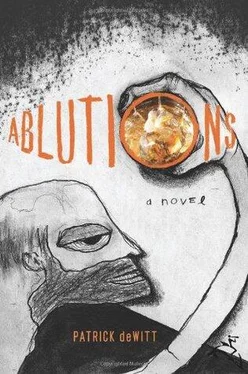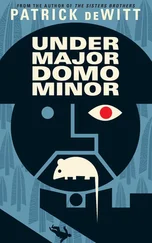Discuss Brent the unhappy doorman. He is unhappy because: He would rather not be a doorman and because his pigeon-toed bowling-pin-shaped girlfriend leaves him once a month to sleep with his closest friends, whom he dislikes, and who dislike him. He is also unhappy because he suffers from an intestinal disorder whose symptoms are too dire to describe but that he describes often, in precise detail — the malady makes his job of standing in a fixed public location dangerous bordering on torturous. His primary shattering dream is to be a boxer or wrestler or cage fighter — any type of recognized tough, but this will not be realized because Brent is five feet two inches tall and despite his constantly working out and injecting growth hormones he will never attain the desired stature of the truly intimidating violence professional. His secondary shattering dream is to produce cable television shows and during his first two years at the bar this is all he ever speaks of (he is not yet the unhappy doorman but the optimistic, superior doorman). At one point he is close to having a show made into a pilot and he tells you about the many meetings and lunches he attends and he begins using conspicuous Hollywood phrases like spec and soft-scripting and postproduction, and when he speaks of these things he is animated and gleeful and he says that when he receives his first check he will kiss it like a sweetheart, his ticket out of the bar and a lifetime of dirty ID cards, graceless fistfights, smoke-stinking T-shirts, and cymbal-crashing hangovers.
But now his Hollywood banter tapers off and in a few months this talk of miniplots and antiplots and greenlights is a thing of the past and it is understood that his deal has fallen through. He begins to drink on the job and is always motioning for you to bring him secret shots of vodka and he does not care to hear about how busy you are and grows frantic if you leave his glass empty for too long and by last call he is belligerent and unnecessarily forceful in clearing out the bar and as soon as the customers have gone he rushes to the bathroom to suffer under his intestinal condition, the effects of which you can hear, and you hurry over to the jukebox cash in hand to drown out the sound of his sickness.
Lancer does not return to unemployment insurance but takes up his post at the bar, steeled by a pay raise and the belief he will soon move on to bigger and better things. His reception among the customers and employees, Simon in particular, is at first chilly, but he is not concerned; his agent sees great things in his future which he parrots for you and the bartenders, most of whom are actors or ex-actors themselves who have heard similar chatter from their own agents and ex-agents, and they explain to him that these are lies perpetrated by all agents everywhere, and that bolstering a client's ego through deceit is the agent's primary function. Lancer chalks this talk up to sour grapes. "I'm sympathetic," he says. "How would you feel after fifteen years of failure?"
"Ask me in five years," you say. But you agree with his agent — Lancer is out of place at the bar, and he probably will move on to bigger and better things. His features are too fine, his heart too clean, unblemished by envy and gluttony and self-hatred, to stand in such a room as this for very long. And just as he hopes to leave the bar and surround himself with similarly scenic people, you and the others also want to see him go, that you might forget such a set of teeth ever existed, and that you could continue on without the constant reminder of what was missing from your genetic makeup.
Lancer has been at the bar six months and is now more or less an accepted member of the staff. He is teased but only playfully and his orders, previously ignored, are now followed if not to the letter then at least close to the letter. Even Simon has warmed to him after Lancer got him an audition with his agency. But one person remains critical of him, and that is Brent the unhappy doorman, who at the start of their relationship acted the part of the condescending Hollywood elder, one who had dealt with the big boys and lived to tell the tale, but as his own life falls apart he no longer hides his jealousy and becomes overtly nasty. He hopes to rally the employees against Lancer but this campaign has a reverse effect, the group feeling being that anyone who can arouse such disfavor from a person like Brent must not be all bad. And so it is with something resembling sadness that the bar says goodbye to Lancer during his tenth month of employment — he has sold his movie script and is taking his parents on a Hawaiian vacation before settling into a life of wealth and flashbulbs. The employees are gathered around him at the end of his last night when Brent walks up and asks what the cause of celebration is. When Lancer turns and tells him, Brent winces and sputters that the script will be put on a shelf and forgotten and that he will be back tending bar within a year — shocking behavior, even for someone as miserable as Brent, and the group is struck dumb by so blatant a display of bitterness. Brent too is quiet. He seems startled by his own declaration, and before anyone can gather their wits to chastise him he pretends he had only been joking and that he is actually glad for Lancer and he extends his hand and Lancer takes it up and Brent asks what the script sold for and Lancer names a number in the mid six figures and Brent once again winces and says he does not believe it and Lancer drops a copy of Variety on the bar for him to check the amount. Finding that the article corresponds with Lancer's price, Brent staggers backward, breathing heavily, then rushes for the exit, grabbing a barstool on his way out and kicking the door open with his boot. As the door swings closed, you and the others in the group, your necks identically craned, can see him hoist the stool over his head and smash it to bits on the sidewalk.
Discuss the very tall man, whom you see or think you see as you drive up Echo Park Avenue one night on your way home from work. The moon is full and low and shadows fall in such a way that you glimpse from the corner of your eye the silhouette of a man as tall as a single-story building. He is leaning against the wall of a convenience store and you see his wide hat and dark clothing and know he could cross the street to your car in two long strides and you think of him following you home and crawling through your front door on his hands and knees. You begin to dream of him hiding outside your house and your greatest fear is to think of him looking in a window when you are home alone. His hat would slowly come into view through the darkness and trees and bushes and you would lock eyes with him and he would show his teeth and point to the front door.
Ignacio does not drink, but like the others is in attendance every night. He is a Spanish expatriate in his mid-fifties, a mechanic living in the comfort of his ailing aunt's guesthouse. For reasons that remain obscure he is heavily medicated. He suffers from dizzy spells and sometimes leans against the bar for support and his eyes bulge from their sockets and he once passed a hand over his face and told you, "I am not a handsome man." This was only a piece of another throwaway bar story whose plot you no longer remember, but each time you greet Ignacio you are reminded of this proclamation. It was a magnificent thing to say and you admire him for his self-knowledge.
His coat and shirt are pressed, his shoes shined, his bald head buffed and bright, and his mustache trimmed to fine points — Ignacio is terrifically vain. He has fashioned a pair of pants from heavy leather and adorned them with patches of his own design: Horseshoes, steer heads, shooting stars, and moonbeams. The pants lace up in the back and you wonder whose job it is to help him tie off the garment. Pointing to the leather, you tell him he is bulletproof and he shakes his head. "Asshole-proof," he says. His laughter is like the barking of a dog.
Читать дальше












